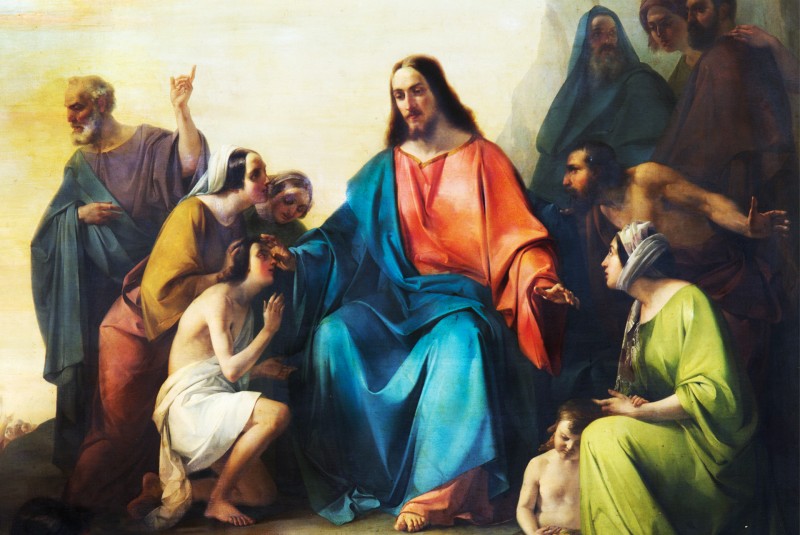Jesus is the Ecumenical Christ, the Divine Statesman
Understand the Luminous Presence of the One who still lives among us.
Article by The Jesus, the Ecumenical Christ, the Divine Statesman Academy*
Jesus, the Sublime Governor of Planet Earth, is much more than a figure that should be respected in the religious sector. His examples of Peace and Universal Solidarity can be experienced in all areas of human and spiritual knowledge. In this respect, the President-Preacher of the Religion of God, of the Christ, and of the Holy Spirit1, José de Paiva Netto, stated back in 1989:
“Jesus being the Divine Liberator, ipso facto, He cannot be sectarianized and, therefore, a prisoner of this or that religious conviction, no matter how brilliant and respectable it might be. He is an extraordinary Heavenly Ideal of Humanity, Love, Solidarity, and Justice for all the Human and Spiritual Beings on this planet.”
When we allow His Divine Influence to be present in our homes, in our work, and in the community where we live, we are capable of achieving a better reality, an improved version of ourselves. You just have to look at His Sublime examples that even today have repercussions around the world.

The way in which Jesus expanded the concepts of Equality, Love, and mutual collaboration between those who suffered countless rejections because of their physical, cultural, political, economic, and social differences is immeasurable. It was through Him that women became social individuals and gained respect and Soul and were recognized as Daughters of God; that children gained visibility and were welcomed into the bosom of the family; and that so many other people started being seen equally, including the sick. His example of struggle for those who suffer from physical illnesses gave rise, in the following centuries, to the first hospitals, the first places in which sickness was no reason for condemnation and prejudice.
In His Gospel, the Divine Friend invites us to recognize Him for His Goodwill actions:
"If I am not doing the works of my Father, then do not believe me; but if I do them, even though you do not believe me, believe the works, that you may know and understand that the Father is in me and I am in the Father.” (John, 10: 37 and 38).
Jesus taught us to act with Love, without expecting anything in return. He called us to give the best of ourselves for the Good of our fellow men. Because of all this Christ established the Ecumenism on Earth, which, as writer Paiva Netto always reminds us, must be understood “in its original sense: oikoumenikós, which means ‘of worldwide scope or applicability; universal’.”
When people are ecumenical they are so confident about themselves that they do not see the need to impose themselves on others. They feel complete by being useful; they find meaning in life by serving the common Good; they are humble enough not to want to exist alone, not to insist on having a solitary view of any knowledge. They have that courage that great people have, who learn even from their most implacable opponents... They have a sense of justice that is greater than the vice of vanity and a thirst to learn as their priority, instead of winning. They think with a gigantic Soul, bound to God through the Love for His creatures. They wish more for the Peace of all than the victory of one. That is how we should experience Ecumenism. And precisely because He lived all of this, showing us that it is possible and not a distant and intangible dream, that Jesus is the Ecumenical Christ.
His character as the Divine Statesman can be described beyond the historical perspective or the formal politics constituted at that time. Paiva Netto affirms:
“Jesus is, above everything, a generous and very modern, ongoing idea that deserves to be studied and lived by all non-sectarian Souls, which are free from prejudice and taboos, and consequently willing to study and learn, with open minds and hearts, without holding preconceived opinions".

Jesus led multitudes to experience Peace; He was fair in His acts; He taught us to obey the Laws and went further when He revealed to us the Universal Laws that govern the Universe; He strengthened families, the nucleus of society; He presented to the powerful of the world the Power of the generosity of God; He revealed to us that autonomy and freedom are first achieved within ourselves and that our destinies are often conditioned by the shackles we impose. Christ taught us that no one can be happy if there is someone at our side who is suffering. That is why He governs, because He enabled us to achieve sovereignty in our decisions. Even if we do not notice His Heavenly influence He leads us, to the extent that we allow Him, to construct a world that is fairer, fraternal, and of true dignity.
His Sublime Presence has accompanied us since the foundation of this Humanity, which was created by Him, as reported in John, 1:1 to 3: “In the beginning was the Word, and the Word was with God, and the Word was God. He was in the beginning with God. All things were made through him, and without him was not any thing made that was made.” We have never been abandoned. For this reason we affirm that Jesus is the Ecumenical Christ, the Divine Statesman, because in making us our own masters He governs this planet and leads us to happiness.
Send your doubts and comments on this and other topics to the Religion of God, of the Christ, and of the Holy Spirit. Let the Ecumenical Spirituality be part of your life! If this content does you good, share it! It may touch the heart of many other people too.
__________
*“The Jesus, the Ecumenical Christ, the Divine Statesman Academy is composed of the Institute for Study, Research and Practice of the New Commandment of Jesus and of the Institute for Study and Research of the Science of the Soul. Through the production of universal knowledge, i.e., divine and human knowledge, its objective is to disectarianize the way some people see the Christ of God and Christianity. In other words, to show the influence and applicability of the ecumenical and eternal teachings of the Heavenly Academic in all fields of spiritual and human knowledge, by presenting Him to Humanity in an all-encompassing, fraternal and undeniable manner.” Definition of Paiva Netto, when founding the Jesus, the Ecumenical Christ, the Divine Statesman Academy, on February 1, 2007.
1Religion of God, of the Christ, and of the Holy Spirit — also called the Religion of the Third Millennium, and the Religion of Universal Love. This is the Ecumenical Religion of Brazil and abroad.
Version: Rob Dinham
Revision: Felipe Duarte



